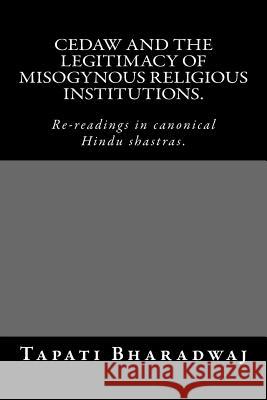CEDAW and the legitimacy of misogynous religious institutions.: Re-readings in canonical Hindu shastras. » książka
CEDAW and the legitimacy of misogynous religious institutions.: Re-readings in canonical Hindu shastras.
ISBN-13: 9789384281014 / Angielski / Miękka / 2016 / 62 str.
CEDAW and the legitimacy of misogynous religious institutions.: Re-readings in canonical Hindu shastras.
ISBN-13: 9789384281014 / Angielski / Miękka / 2016 / 62 str.
(netto: 20,85 VAT: 5%)
Najniższa cena z 30 dni: 22,01
ok. 16-18 dni roboczych
Bez gwarancji dostawy przed świętami
Darmowa dostawa!
The Convention on the Elimination of All Forms of Discrimination against Women (CEDAW) was adopted in 1979 by the UN General Assembly, and can be seen as an international bill of rights for women. All countries that have accepted the Convention are compelled to follow up with a series of measures that would end all forms of discrimination against women. Any country that has ratified or acceded to the Convention, is legally and morally obliged to ensure that women are not discriminated against, or oppressed. If the purpose of CEDAW is to end all acts of discrimination against women by organizations, then we would be compelled to include organizations that propagate religion in the public domain as mostly and often, these religious bodies propound theology that is comfortably couched in misogyny, thereby validating a heightened sense of machismo as being endemic to human behaviour. Undoubtedly and what is obvious is that any nation that is a participant to CEDAW is legally bound to examine and interrogate the role that is played by these religious organizations in normalising misogyny and in also disseminating these ideas in the public domain on a daily basis. One of the Fundamental Rights that is granted to all citizens of India is the Right to Freedom of Religion, which is Article 25 in the Constitution of India. I quote at lengths to validate my point: Article 25. Freedom of conscience and free profession, practice and propagation of religion.- A sub-clause of Article 25 aims towards "throwing open of Hindu religious institutions of a public character to all classes and sections of Hindus." If we closely examine the above, we can arrive at the obvious conclusion that the State can make laws that throw "open" Hindu religious institutions of a public character to all classes and section of Hindus. If we take this as a basic premise that is granted to us by the Constitution, then we can also argue that simply throwing open the doors of "religious institutions" is not enough and we need to scrutinise what exactly is propounded and propagated within the walls of these "religious institutions of a public nature"; it is one thing when these religious institutions talk about God and the Supreme Being and the Hindu shastras, and it is also another thing when these institutions also throw in a lot of theology which is outright misogynous and sexist and caste-ist, and thereby excludes half the population of India. Are religious institutions participants in propounding sexist and caste-ist theology which affects how people engage in their every-day lives? Do these institutions therefore, violate the Fundamental Rights that are granted to all the citizens of India by the Constitution. Moreover, if such caste-ist and sex-ist discourse is allowed to function in the public realm, it tantamounts to being unconstitutional and comprises a violation of one of the Fundamental Rights that has been granted in India, namely, Article15 of the Constitution of India and is the Right to Equality. The fact that religious institutions often and always propagate misogyny ridden social dictums and equate them with notions of Existence and Hindu theology, makes us question the constitutional validity of the practise, as it is a flagrant violation of Article 15, which aims towards undoing all discriminatory practises. How we, that is, women - eat, breathe, dress and conduct ourselves and the kinds of labor that we are allowed to perform - are codified and seen as intrinsic to the Hindu shastras. What prevents the government of India (which is also a signatory to CEDAW) from slapping legal cases against these religious institutions as they propound unconstitutional rhetoric that, in all respects, violates our Fundamental Rights that are embedded within the Indian Constitution?











